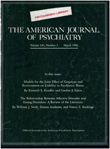The dexamethasone suppression test in suicidal patients with unipolar depression
Abstract
Of 49 newly hospitalized patients who met Research Diagnostic Criteria for primary unipolar depression and were given the dexamethasone suppression test (DST), significantly more patients admitted for suicide attempts than nonsuicidal patients had abnormal DSTs. All five patients who made subsequent suicide attempts (one completed) within 6 months after admission had had abnormal DSTs. These findings suggest that the tendency of endogenously depressed patients to attempt suicide is exacerbated by an underlying neurobiological disorder reflected by limbic-hypothalamic dysregulation and that depressed suicidal patients with abnormal DSTs represent a high-risk group for recurrence of suicidal behavior.
Access content
To read the fulltext, please use one of the options below to sign in or purchase access.- Personal login
- Institutional Login
- Sign in via OpenAthens
- Register for access
-
Please login/register if you wish to pair your device and check access availability.
Not a subscriber?
PsychiatryOnline subscription options offer access to the DSM-5 library, books, journals, CME, and patient resources. This all-in-one virtual library provides psychiatrists and mental health professionals with key resources for diagnosis, treatment, research, and professional development.
Need more help? PsychiatryOnline Customer Service may be reached by emailing [email protected] or by calling 800-368-5777 (in the U.S.) or 703-907-7322 (outside the U.S.).



